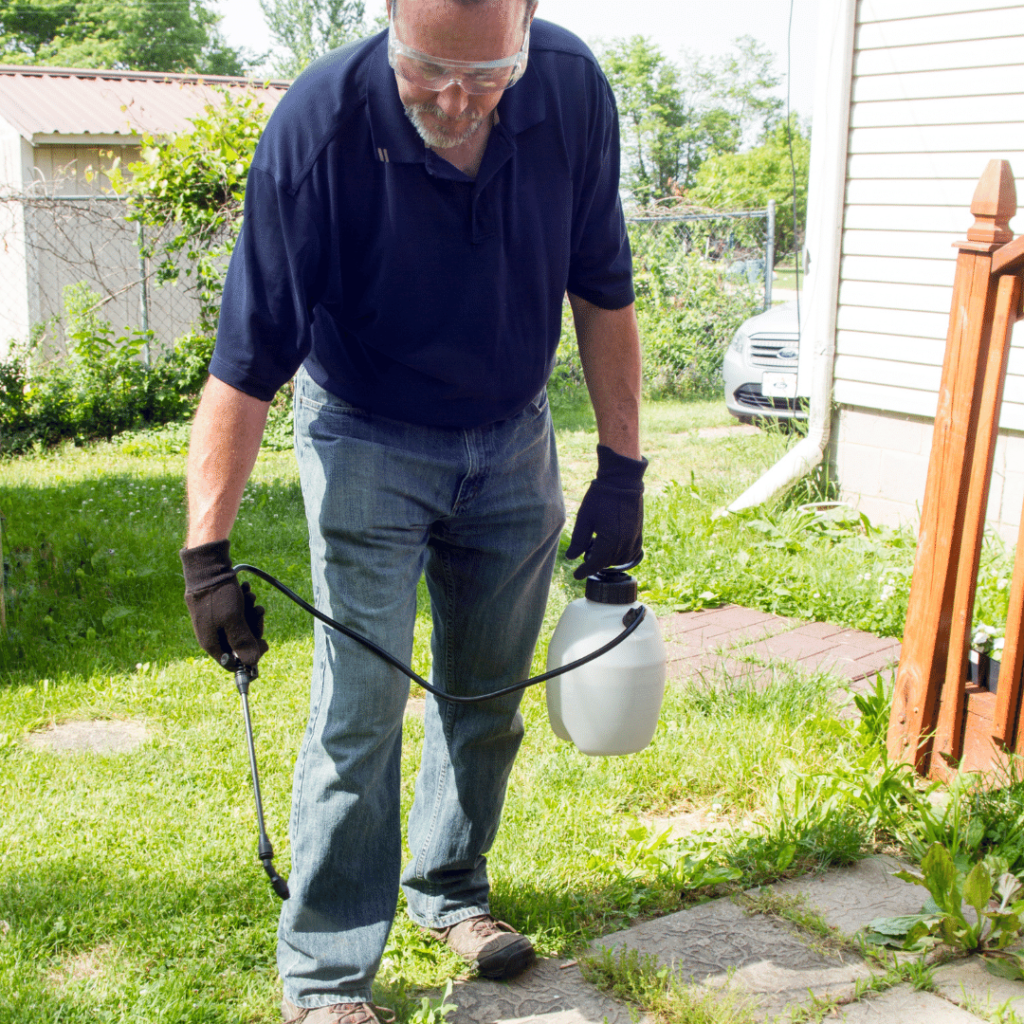Is Your Weed Killer Safe for Pets?

Contents
Now that spring is finally here, many of us are gratefully shifting our focus from shoveling snow to beautifying the lawn and garden.
But as much as you want to banish weeds from your yard, you want your furry family members to be safe, too. And, that can leave you wondering… Is your weed killer safe for pets? Do pet-friendly weed killers even exist? Do they work?
The truth is, most commercial weed killers are not safe for pets, so you’re right to be concerned. The good news is, you don’t have to resign yourself to pulling weeds by hand, you’ve just got to do your research before you spray.
Thankfully there are a handful of effective and pet-safe weed killers on the market. And, if you want to play it extra safe, you can even make your own all-natural weed and grass killer. Here’s everything you need to know!
Is Weed Killer Safe for Pets?

Most commercial weed killers are toxic. They’re not safe to use around pets or humans, and they’re not good for the environment either.
Most commercial weed killers are toxic. They’re not safe to use around pets or humans, and they’re not good for the environment either.
In fact, the chemicals they put in most commercial weed killers come with a number of precautions. They’re known to cause dizziness, breathing issues, eye and skin irritation… maybe even cancer.
Of course, we humans know enough not to get the weed killer on our skin or in our eyes. We know we shouldn’t breathe it in. But our pets don’t know to take those precautions… so it’s up to us to look out for them.
The Dangers of Commercial Weed Killers for Pets
Herbicides like glyphosate and 2,4-D can be very dangerous for pets. If your pet walks in an area that’s been treated with a chemical herbicide while it’s still wet and then licks it off his paws, he is likely to experience severe stomach upset, including diarrhea and vomiting.
Even worse, pets who are older, have compromised immune systems, or who ingest more than a tiny amount of herbicide may even die from the poison.
According to the manufacturers of many of these products, the area is safe for pets once the herbicide is completely dry. However, dogs and cats tend to chew on grass, and it isn’t entirely clear if that’s safe even after the product is dry. And pets with allergies or sensitive skin may develop irritation from rolling in the grass after it’s been treated, too.
So, why risk it? The pet-friendly weed killers listed below are all-natural, making them a much better choice for homes with pets.
Using a Pet-Safe Weed Killer: Best Practices
The weed killers we’re recommending below should present minimal if any, risk to your pets. But it’s still important to note that even natural products can be dangerous under certain circumstances. Be sure to employ the following best practices when using any of the products listed below to further minimize any risk to your pet.
- Pay attention to the manufacturer’s instructions: Most commercial weed killers are formulated to work best when applied in the amount and manner specified on the label. Using more doesn’t necessarily mean you’ll have better results, and it could put your pet at risk.
- Don’t spray when it’s windy: Wind can blow any product you’re spraying into areas where you didn’t intend for it to go. You may end up with weed killer on plants you didn’t intend to kill, or it could end up in areas of the lawn where your pets hang out.
- Keep your pets inside during application: Any time you’re applying a product to your lawn, it’s best to keep your pets indoors until you’re done. Even if the product is pet-safe, you don’t want to accidentally spray him or have him licking up the product after it’s been applied.
- Keep your pets out of the area for about 24 hours: Natural weed killers usually break down over time, or they’re absorbed into the plants and soil. Be sure to check the label on your product, but in most cases, it’s safe to let your pet play in the yard within about 24-hours.
5 Pet-Safe Commercial Weed Killers
Here are five pet-friendly weed Killers you can buy on Amazon or at your local big-box store.
1. Dr. Kirchner Natural Weed Killer
Dr. Kirchner’s Natural Weed Killer is an excellent choice for homes with pets. Its weed-killing power comes from salt, vinegar, and soap. Best of all, the manufacturer says it’s safe to use around people, dogs, cats, chickens, and horses… and it’s safe for the environment, too. Keep in mind that this is a non-selective weed killer, so it will kill any plant you spray it on. While it’s great for areas like cracks in the sidewalk, you wouldn’t want to spray it on your lawn.
2. Green Gobbler Vinegar Weed Killer
Green Gobbler’s Vinegar Weed Killer is made from corn. It’s much more concentrated than the vinegar you use in your kitchen, but it’s still pet-safe and highly effective for killing weeds. This product is glyphosate-free, biodegradable, and certified organic, so you can be confident that it’s safe for you, your fur babies, and the environment.
3. Natural Armor 30% Home & Garden Vinegar
Here’s another highly effective, all-natural, pet-safe weed killer that’s completely glyphosate-free. The only ingredient is highly concentrated vinegar, so it’s highly acidic. However, it can be used for a variety of purposes around the home, including cleaning sidewalks and driveways, reducing the pH of your soil, and even polishing the chrome on your car. It’s extremely effective for killing weeds, but you may need a few applications to kill tough weeds all the way down to the root.
4. Natural Armor Weed & Grass Killer
This pet-friendly weed killer gets its weed-killing properties from vinegar, citrus extracts, and salt. According to the manufacturer, Natural Armor’s Weed & Grass Killer kills more than 250 different types of grasses and weeds. It’s safe for people, pets, and the environment, it’s highly effective, and it’s backed up with a 100% money-back guarantee.
5. Preen Weed Preventer
Preen’s Weed Preventer contains 100% corn gluten meal, so it’s completely natural and pet safe. This product isn’t technically a weed killer, it’s a pre-emergent. Basically, you sprinkle it in any area where you want to prevent weed seeds from sprouting. The cool thing about this product is you can apply it to your lawn a few times each year. It won’t kill the grass or any existing weeds, but it will keep new weeds from growing. It contains 60% protein, which means it also works as a fertilizer to help keep your grass green and healthy.
Homemade Weed Killers That Are Safe for Pets

If you really want to play it safe, you can make your own all-natural, pet-safe weed and grass killer from ingredients you probably already have on hand.
If you really want to play it safe, you can make your own all-natural, pet-safe weed and grass killer from ingredients you probably already have on hand.
· Vinegar
Vinegar makes a fantastic, pet-friendly weed killer. Simply put it in a spray bottle and spray it directly on the weed you want to kill. It may take a few applications to kill tougher weeds, but they will eventually die.
· Sugar
Surprisingly, sugar also makes a pretty decent pet-friendly, natural weed killer. Pouring sugar directly on the soil makes it unsuitable for plant life. Simply pour it right at the base of the weed, bush, or vine you want to kill, wait a few days for the plant to die, and pull it out.
· Boiling Water
Do you have an area that you need to clear of weeds and grass completely, such as the cracks in your sidewalk? Or, maybe there’s a weedy patch in your lawn that you just want to clear completely and start fresh?
Well, you really can’t get much safer than boiling water. Simply pouring it over the weeds will literally cook them and kill them pretty much instantly. Just keep in mind that it will kill every plant it comes in contact with… whether they’re weeds or not.
There’s no risk to your pets with this method, and since there’s no poison involved, you can replant the area with whatever you want right away.
· Salt
Salt is another all-natural weed killer that’s completely safe to use around pets. You can simply put a generous application of salt down on any area where you don’t want grass or weeds to grow. The only drawback is, you won’t be able to grow any other plants in that area for a long time… maybe even years… so you’ll want to keep that in mind before using this method.
Or, you can mix salt with water in a spray bottle and spray it directly on the weeds you wish to kill. Start with three parts water and one part salt. If it doesn’t kill the weeds after a few applications, you can make it a little stronger. It’s best to stick to the weakest effective solution to avoid long-term issues with your soil.
· Cornmeal
If you’re all about a proactive approach to weed control, you might want to give cornmeal a try. Simply sprinkle it on the ground anywhere you want to prevent weeds from growing. Cornmeal contains a chemical that prohibits germination, so it won’t kill existing plants, but it will stop new ones from growing.
· Smother the Weeds
Another highly effective way to kill off the weeds in a large area is to smother them. Mow the area as short as possible, then cover it with a thick layer of newspaper or cardboard. Add a few inches of pet-safe mulch over top. Leaves, pine straw, and un-dyed pine bark mulch are all great options.
The weeds can’t grow without light, so they will die off over time. And, once the cardboard and mulch break down, you’ll have a nice patch of clear, rich soil to plant whatever you like. It’s a great technique for starting new garden beds without tilling or digging- and of course, it’s pet and people safe, too!
Homemade Pet-Safe Weed Killer Recipe
The great thing about using natural weed killers is that they can be combined to make them even more effective. To make a stronger pet-safe weed killer at home, simply combine vinegar, salt, and water in a spray bottle. Add a few drops of dish soap to help it stick to the plants better. The result is a highly effective, pet-safe weed killer you can selectively spray on individual weeds in your yard and garden all season long.
Frequently Asked Questions About Weed Killers and Pets
· Is there a pet-safe way to kill dandelions?
Killing dandelions with weed killer can be tough, mainly because they tend to be numerous and grow right in the middle of the lawn. Normally, the best option would be an herbicide that kills broad-leaved plants, but the safety of those products around pets is extremely questionable. To keep your pets safe, the best option is to pull the dandelions by hand and follow up with a pre-emergent weed killer like cornmeal to keep them from coming back.
· Is there a pet-safe weed killer that doesn’t kill grass?
Unfortunately, selective weed killers that kill the weeds without killing the grass aren’t safe for use around pets. You can try the homemade weed killer recipe above, but you’ll have to be very careful with the application if you want to avoid killing the grass along with the weeds. Your safest bet is probably going to be pulling the weeds by hand.
· Is there a pet-safe way to kill grass?
Yes, there are several pet-safe ways to kill off grass in a large area. Salt and vinegar are both very effective, but you won’t be able to grow anything else in that area for a long time. The smothering method explained above will kill the grass and allow you to plant whatever you like as soon as the grass dies off.
Final Thoughts
It is possible to have a weed-free lawn and garden that’s safe for your pets and it’s definitely worth the extra effort. One of the best things about choosing a pet-safe weed killer is that you know it’s safe for you, your kids, and the environment, too. Just be sure to follow the manufacturer’s directions on any pet-safe commercial weed killer you choose, and you should be good to go.
